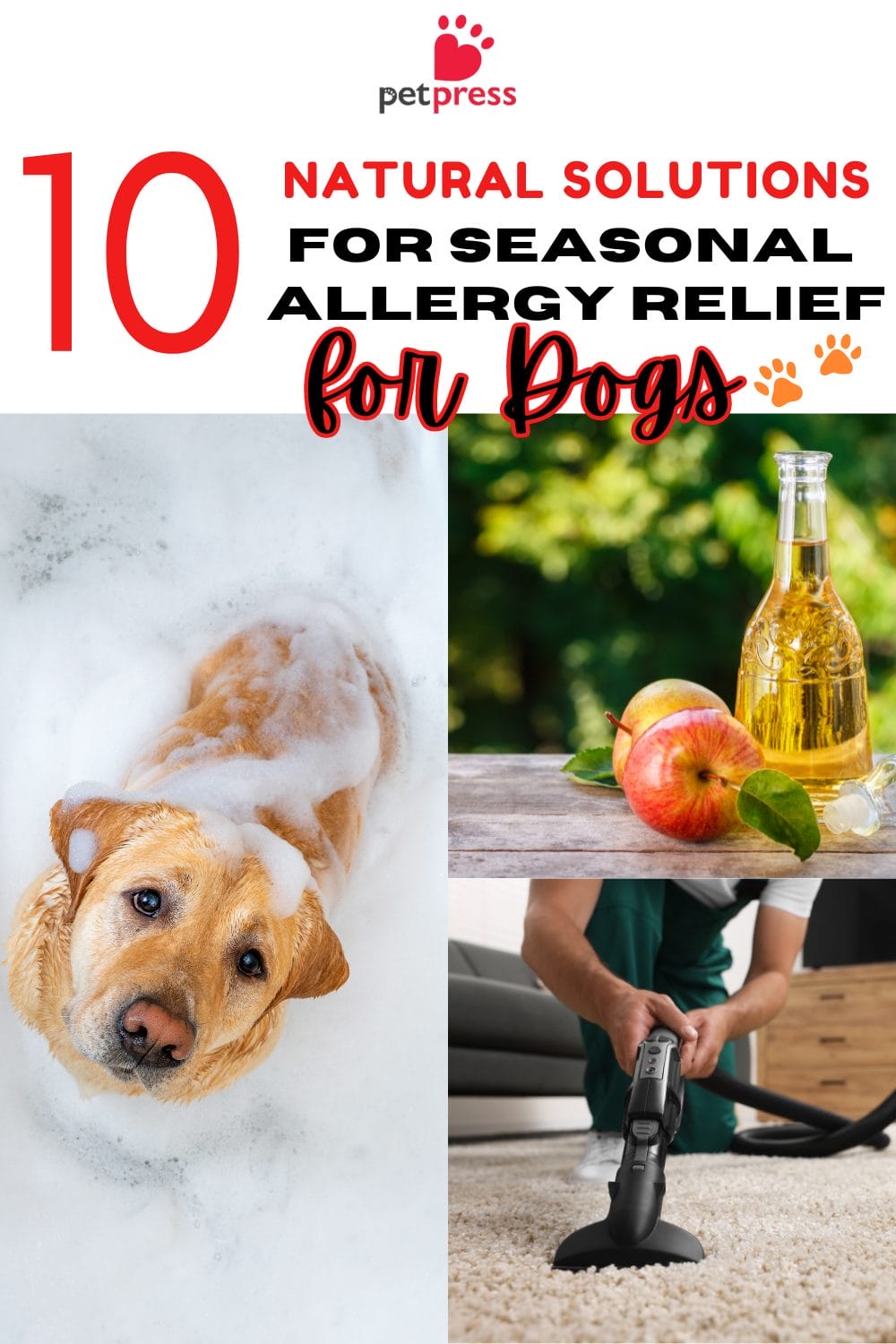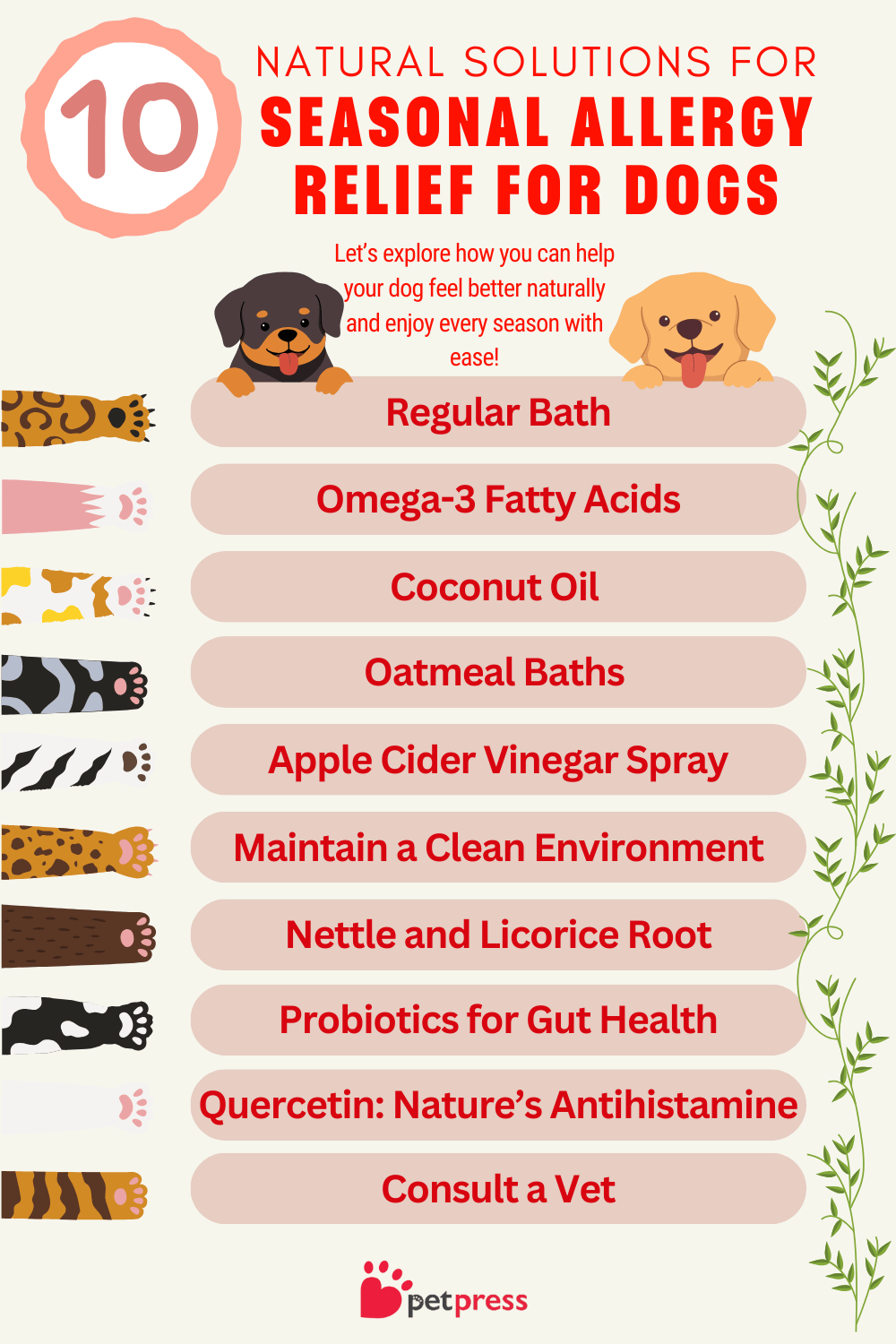
Does your dog start scratching more as the seasons change? They might be suffering from seasonal allergies, just like people do. Seasonal allergy relief for dogs is crucial because these allergies can make your furry friend uncomfortable. Imagine your pet constantly itching, sneezing, or even getting red, irritated skin. It’s tough to watch!
That’s why it’s so important to find natural solutions. Many pet owners prefer natural remedies because they are safer and gentler on their pets. Plus, using natural methods can often prevent the unwanted side effects that harsher chemical treatments bring. Let’s explore how you can help your dog feel better naturally and enjoy every season with ease!
What Are Seasonal Allergies?
Seasonal allergies, also known as seasonal allergic reactions, happen when dogs react to allergens that appear during certain seasons. Common triggers include pollen, mold, and dust. These allergies can make your dog miserable if not managed properly.
Common Symptoms of Seasonal Allergies in Dogs:
- Itching: Dogs often scratch more than usual or might bite their skin.
- Sneezing: Just like humans, a sneezing dog might be reacting to airborne allergens.
- Red or Irritated Skin: Look for changes in your dog’s skin, especially redness or sore spots.
- Watery Eyes: Allergies can cause their eyes to water or become red.
Understanding these signs can help you seek timely treatment and provide relief to your furry friend. Remember, each dog might show different symptoms, so it’s important to pay close attention.
Why Choose Natural Relief Methods?
When it comes to seasonal allergy relief for dogs, natural solutions are a top choice. They’re safer than many chemical treatments. This means you can help your pet without worrying about harsh side effects.
- Safety First: Natural remedies are generally gentler on your dog. They’re made from ingredients you often find in your own kitchen or garden.
- Fewer Side Effects: Unlike some medications that can cause additional health issues, natural options reduce that risk. Your furry friend won’t have to deal with complications just to feel better.
- Sustainable and Kind: Using natural methods is also better for the environment. Plus, it feels good to use simple, earth-friendly solutions that you trust.
Choosing natural allergy relief methods allows your dog to heal in a way that also nurtures their overall well-being. This approach can strengthen your bond as you provide them with loving care that feels good and is effective.

Top 10 Natural Ways to Help Your Dog with Seasonal Allergies
As a pet owner, seeing your dog struggle with seasonal allergies can be disheartening. Fortunately, there are several natural ways to ease their discomfort and improve their quality of life. Here are the top 10 natural solutions to provide seasonal allergy relief for dogs, complete with simple, step-by-step instructions to implement each method.
1. Bathing Your Dog Regularly
Bathing your dog regularly is a simple yet effective way to provide seasonal allergy relief for dogs. When your dog plays outside, allergens like pollen, dust, and mold can stick to their fur. A good bath washes these irritants away, preventing them from causing itchiness and discomfort.
- Removes Allergens: Regular washing helps strip away particles that can trigger allergies.
- Soothes Skin: Water and mild dog shampoos soothe irritated skin and can reduce redness.
- Strengthens Fur: Clean fur is healthier, which can help protect skin from environmental irritants.
Remember, while bathing is beneficial, it’s important not to overdo it. Too frequent baths can dry out your dog’s skin. Aim for a balance that keeps your furry friend fresh without causing dryness.
2. Omega-3 Fatty Acids: A Natural Anti-Inflammatory
Omega-3 fatty acids are a real superhero for dogs with allergies. These special fats, found naturally in certain fish and some plant oils, are known for fighting inflammation. This can help calm your dog’s allergic reactions.
- Reduce Skin Irritation: By adding omega-3s to your dog’s diet, you can help reduce the redness and itchiness that allergies bring.
- Boost Overall Health: Omega-3 not only helps with allergies but also improves your dog’s coat, making it shiny and healthy.
You might be wondering how to include more omega-3 in your dog’s meals. It’s simple! Add a bit of fish oil to their food or consider special dog foods that include these fatty acids. Your furry friend will feel better, and you’ll feel great about using a natural remedy to ease their discomfort.
3. Coconut Oil for Skin Relief
Coconut oil isn’t just great for cooking; it’s also a soothing remedy for your dog’s skin. When dogs suffer from seasonal allergies, their skin can become dry and itchy. Applying coconut oil can help moisturize and calm this irritation.
How to Apply Coconut Oil:
- Start with a small amount, as a little goes a long way.
- Rub the oil between your hands, then gently massage it into your dog’s fur and skin.
- Focus on areas that are especially dry or itchy.
Using coconut oil as a natural skin relief for dogs is effective because it contains properties that reduce inflammation and hydrate the skin. Plus, dogs love the taste, which makes application easier! Just make sure to choose organic, virgin coconut oil for the best results.
4. Oatmeal Baths for Itchy Skin
Oatmeal baths are a fantastic and gentle way to help soothe your dog’s itchy skin. This natural remedy is great for easing discomfort caused by seasonal allergies. It’s like a spa day that calms their irritation and makes them feel better!
Benefits of Oatmeal Baths:
- Soothes Irritation: Oatmeal has natural properties that calm inflamed skin and reduce itchiness.
- Moisturizes Skin: It helps retain moisture on your dog’s skin, keeping it hydrated and healthy.
- Safe and Natural: Using oatmeal is a safe treatment that avoids harsh chemicals.
How to Give Your Dog an Oatmeal Bath:
- Step 1: Blend plain, uncooked oatmeal into a fine powder using a blender or food processor.
- Step 2: Fill your bathtub with warm (not hot) water and sprinkle the oatmeal powder in it. Stir well to mix.
- Step 3: Gently place your dog in the tub and use a cup or hand to pour the oatmeal water over their body.
- Step 4: Allow them to soak for about 10-15 minutes, occasionally pouring more oatmeal water over them.
- Step 5: Rinse your dog off with clean, warm water to remove any oatmeal residue.
- Step 6: Pat them dry with a towel, making sure they are as dry as possible.
After an oatmeal bath, many dogs show immediate relief from itching and discomfort. Regular oatmeal baths can help manage your dog’s skin health, especially during allergy seasons. It’s a simple, effective way to provide relief and show your pet some love!
5. Apple Cider Vinegar Spray
Apple cider vinegar (ACV) is a popular home remedy known for its potential to ease itchiness in dogs suffering from seasonal allergies. However, it’s important to use it correctly to avoid irritating your pet’s skin further.
- Always dilute apple cider vinegar with water before applying it to your dog’s skin. A safe mixture is typically a 50/50 ratio of ACV to water.
- Use a spray bottle to apply the diluted ACV solution to your dog’s itchy areas. Alternatively, you can use a soft cloth dipped in the solution to gently dab it on.
- It’s crucial to avoid using ACV on any open sores or raw skin, as the vinegar can cause a burning sensation and worsen the irritation.
Regular use of this diluted apple cider vinegar spray can help relieve your dog’s discomfort caused by allergies. By keeping these easy steps in mind, you can help your furry friend feel more comfortable during allergy season.
6. Maintaining a Clean Environment
Keeping your home clean is key to reducing your dog’s allergy symptoms. Regularly clean floors, carpets, and furniture to remove allergens.
- Frequent Vacuuming: Use a vacuum with a HEPA filter to capture tiny allergens that irritate your dog.
- Wash Bedding Weekly: Clean all pet bedding in hot water every week to kill dust mites and remove allergens.
- Air Purifiers: Place air purifiers in common areas and near your dog’s favorite spots. This helps reduce airborne allergens.
A clean home creates a safe haven for your dog, minimizing the triggers that cause allergic reactions. Simple changes in your cleaning routine can make a big difference in your comfort and health.

7. Herbal Remedies: Nettle and Licorice Root
Have you ever considered herbal remedies for your dog’s seasonal allergies? Herbs like nettle and licorice root are fantastic natural options. They are gentle on your pup’s system while effectively reducing allergy symptoms.
- Nettle: This wonderful herb acts as a natural antihistamine. It helps control the body’s response to allergens, reducing itching and sneezing.
- Licorice Root: Known for its anti-inflammatory properties, licorice root soothes your dog’s itchy skin. It’s like a natural steroid without the harsh side effects.
Using these herbs can make a big difference in your dog’s comfort during allergy season. Always check with your vet before starting any new treatment to ensure it’s safe for your specific pet.
8. Probiotics for Gut Health
Did you know that a healthy gut can mean less itching and sneezing for your dog? Probiotics are great for promoting good gut health, which can help manage seasonal allergies in dogs. When your dog’s gut is healthy, their body is better at fighting off allergens.
- Enhance Immune Response: Probiotics help balance the good bacteria in the gut. This balance boosts your dog’s immune system, helping to fight allergies naturally.
- Reduce Inflammation: A healthy gut reduces inflammation throughout the body. This can lessen the severity of allergic reactions like skin irritation or itching.
Adding probiotics to your dog’s diet is simple. You can find probiotic supplements specifically designed for dogs at most pet stores. Alternatively, adding a spoonful of plain, unsweetened yogurt to their food can also help boost their gut health.
Remember, each dog is unique, so it’s good to consult with your vet before starting any new supplement. They can recommend the best type and amount for your pet’s specific needs, ensuring your furry friend feels better during allergy season.

9. Quercetin: Nature’s Antihistamine
Quercetin is often called nature’s antihistamine. It is a natural compound found in fruits and vegetables. This powerful substance can help manage your dog’s allergy symptoms.
Here’s how quercetin helps your furry friend:
- Blocks Allergic Reactions: It works by stopping the body from releasing histamines. Histamines are chemicals that cause allergy symptoms like itchiness and inflammation.
- Natural Anti-Inflammatory: Quercetin also reduces inflammation, making it great for soothing irritated skin.
Adding quercetin to your dog’s diet can be a game-changer:
- Safe and Natural: It is a safer option compared to synthetic medications.
- Ease of Use: You can find quercetin supplements specifically designed for pets.
By integrating quercetin into your dog’s care routine, you can help them enjoy a more comfortable life. This natural remedy will not only ease their symptoms but also boost their overall health.
10. Consult a Vet for a Customized Plan
Even with many natural options available, it’s crucial to consult a vet for tailored advice. They can offer the best seasonal allergy relief plan for your dog.
Always remember, when it comes to health, professional advice is invaluable. Your vet will help you blend natural and medical solutions for your pet’s best care. This approach ensures your furry friend gets the most effective and safe allergy relief.

Conclusion: Integrating Natural Solutions into Daily Care
In our journey through the world of natural remedies, we’ve uncovered several safe and effective methods to provide seasonal allergy relief for dogs. By integrating simple practices like regular baths, adding natural supplements, and exploring herbal remedies, you can help your dog not just endure but thrive during allergy season.
Remember, it’s all about finding what works best for your furry friend. Each dog reacts differently to various treatments, so it may take a bit of experimenting to discover the perfect combination. Think of it as a way to deepen your bond with your pet as you work together to tackle their allergies.
Finally, we’d love to hear from you! If you’ve tried any of these natural solutions, or if you have other tips for managing dog allergies, please share your experiences. Your insights could help other pet owners navigate the challenges of seasonal allergies. Together, let’s strive for happier, healthier lives for our dogs, ensuring they can enjoy every season with minimal discomfort.
Thank you for joining us on this natural journey to better health for our canine companions!
FAQs
Dogs with seasonal allergies often scratch a lot, have red or irritated skin, and may sneeze or have watery eyes. Regular grooming can help spot these signs early.
Absolutely! Adding omega-3 fatty acids and other natural supplements, like quercetin, can help reduce inflammation and improve skin health.
Bathing your dog once a week during peak allergy seasons can help wash away allergens from their fur and skin.
Oatmeal baths and coconut oil are great for soothing itchy skin. You can also try aloe vera or a DIY apple cider vinegar spray.
Yes, improving indoor air quality can make a significant difference. Consider using air purifiers and keeping your home clean to reduce indoor allergens.
- Does Cat Litter Melt Ice? The Complete Guide to Winter Safety - January 30, 2026
- Happy Tail Dogs: Understanding This Common Canine Condition - January 29, 2026
- How Cold Can Outdoor Cats Handle? Feline Winter Safety - January 27, 2026


GIPHY App Key not set. Please check settings